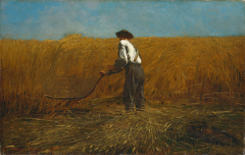The Uses of Occupations
Charity with Farmers, Workmen and Servants
Exodus 31:1-5. And Jehovah spoke to Moses, saying, See, I have called by name Bezaleel, the son of Uri, the son of Hur, of the tribe of Judah; and I have filled him with the spirit of God, in wisdom, and in understanding, and in knowledge, and in all work; to think thoughts, to make in gold, and in silver, and in bronze; and in crafting of stone for filling, and in crafting of wood, to do in all work.
Charity 168. Charity in Workmen. By workmen are meant operatives and artificers of the various kinds. If they look to the Lord and shun evils as sins, and do their work sincerely, justly, and faithfully, they become forms of charity, each in proportion as he loves his work and is diligent in it. For their works are goods of use serviceable to the neighbor for various necessities and uses; as for food, clothing, dwelling, protection, preservation, pleasure, and in many other ways; and they are the gains of the commonwealth. Just in so far as anyone puts his mind into his work and labor, from the love of it, he is in it, as to affection and thought concerning it; and in proportion as he is in it, he is withheld from thinking of and loving vanities, and afterwards he is led by the Lord to think of and love goods; and also to think of and love the means to good, which are truths. It is not so with one who applies himself to no work. Every workman who looks to the Lord and shuns evils as sins, shuns idleness, because it is the devil’s pillow; shuns insincerity and fraud; and shuns extravagance and intemperance. He is industrious, sincere, sober, content with his lot, and works for his neighbor as he would for himself, because in doing his work, he loves himself and his neighbor in equal degree.
Charity 169. Charity in Farmers. Farmers, or husbandmen and vine-dressers, if they look to the Lord and shun evils as sins, and do their work sincerely, justly, and faithfully, become charities, as to their spirits, and after death, when they become spirits, they are in a form of charity; and that form is the human form, in which all are after death. Farmers such as these rise early in the morning, arrange their work, apply themselves with energy to their labor, are indefatigable in their work, and rejoice in it. When their work is done, they are economical, sober, and vigilant. At home with their families they act justly; abroad, among others, with sincerity. They regard the civil laws of justice, like those of the Decalogue, as Divine, and obey them. They love their fields and their vineyards, because of their produce; and love the fruits of them because they are blessings, and render thanks to the Lord, and so look to the Lord continually.
Charity 172. Charity in Servants. Servants, as well as masters, become charities, that is, angels, when they look to the Lord and shun evils as sins, and perform the duties of a servant sincerely, justly, and faithfully. Their duties, which are special and continual goods of charity, are, to attend on their masters, to wish well to them, to speak no ill of them, to act as uprightly in their absence as in their presence, and not to scorn to serve. For everyone, in whatever degree of dignity, ought to serve. Even a king should serve the Lord. And so far as anyone serves faithfully he is loved and led by the Lord. And so far as anyone looks to the Lord and shuns evils as sins, he serves freely, and not by compulsion.
Questions and Comments
- Charity 168 teaches about putting one’s mind into one’s work from a love of it. What should we do if we find ourselves in a job that we do not like?
- Why is idleness referred to as the devil’s pillow (n. 168)?
- What does it mean to shun extravagance (n. 168)?
- What do you think about the explanation regarding how famers can be forms of charity (n. 169)?
- What do you think is a use today that is equivalent to the uses of servants as described in Charity 172?
| previous |  |
next |
|---|


